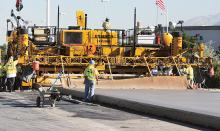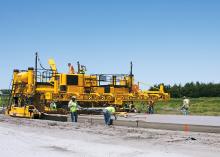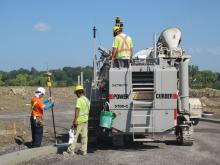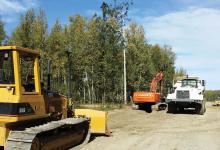
A historic route in the US state of Arkansas has benefited from the use of machine control during its upgrade
The south-west - north-east US Route 67 in Arkansas has long been a significant transport route. This old road follows the natural break between the Ozark Mountains and the Ouachita Mountains. In the 1920s, funding became available for road paving, and the route was designated US Route 67.
Over the years, traffic volumes have increased significantly on US Route 67, which has required maintenance, rehabilitation, and in some cases newly developed stretches.
In 2013, the Arkansas State Highway and Transportation Department let a project to build a new section of Route 67 on a new route, which runs roughly from west of Cash north to Walnut Ridge. This is providing a two-lane divided highway, replacing the original single-lane highway.
Weaver-Bailey Contractors, based in El Paso, AR, won the project and became the general contractor on the US$20 million 15.8km section. Weaver-Bailey is a concrete paving specialty contractor that also performs the earthworks and grading prep work necessary for paving. The project commenced in January 2013 and is expected to be completed by the end of 2015.
“This is brand new roadwork being constructed on former farm land,” said Roger Weaver, paving superintendent with Weaver-Bailey Contractors. “It’s a challenge since the fertile soil really holds moisture. The ground is great for planting crops, but not so great for a concrete highway.”
This past winter was mild for the area. Night-time temperatures could be from -6°C, but during the day the temperatures would typically rise above 4°C. According to Weaver, these were temperatures they could work in and pour concrete.
The new concrete highway features two 3.66m wide lanes and a 610mm shoulder on each side. Weaver-Bailey completed the highway with three layers: a cement-stabiliser base, a thin asphalt interlayer, and a surface layer, using a crew of 14.
The 152mm cement stabiliser functions as a sub-base layer reinforcing and protecting the subgrade. The 308,348m2 of cement stabiliser was rough graded with a dozer and finish graded with a motor grader—both equipped with machine control.
“We want to ensure accurate grade and no material waste so we use
Weaver-Bailey works with both TrenchSafety and Supply, based in North Little Rock, AR, and Topcon to match the technology to the application.
“They’re familiar with the benefits of machine control and have been using systems on their dirt machines for years, so it was natural for Weaver-Bailey to migrate into paving,” said Steven Simon, TrenchSafety and Supply vice president/branch manager for the Memphis and Little Rock locations. “Along with Topcon and
Brian Lingobardo, systems manager 3D road construction for Topcon added, “This was a new machine and application for Weaver-Bailey so it was essential that GOMACO and Topcon were united for the start-up and training.”
A significant benefit, according to Weaver, is that with machine control the project neither requires stakes nor the surveyors to place them.
“We save considerable time and surveyor expense during all phases of the project by having the constant of the data points and design within the system,” said Weaver. “It is so much easier not having to worry about running over stakes and then replacing them. A major plus is having no stringlines in the way.”
The 25.4mm layer of asphalt interlayer was placed by a subcontractor. The bond breaker asphalt lift separates the finish overlay concrete from the cement-stabiliser pavement underneath. It is designed to provide support for the overlay.
“We want the finished road surface to be very smooth, that’s why it’s critical that the cement stabiliser and asphalt interlayer surfaces are graded to tight tolerances,” Weaver said. “Then, to ensure we have the smoothest concrete surface, we used Topcon Millimeter GPS technology on our GOMACO slipform paver.”
The company used a four-track GOMACO GHP-2800 slipform paver equipped with a Topcon 3D paving system on the project. The paver features an IDBI in-the-pan dowel bar inserter, paving 7.25m wide, inserting 23 bars across the slab, 300mm apart.
“The machine’s operating system with stringless technology benefited us greatly in lower costs, higher production, and better results,” said Weaver. “We’ve been using 3D paving for the past two years and like that we get real-time navigation with direct access to the design data from our CAD project model. It accommodates radii and superelevations automatically.”
Topcon's Millimeter GPS Paver System controls the lift cylinders independently. The machine operator has access to critical information. The GX-60 control box in the GOMACO paver’s operator compartment features a screen display of machine position on the job, and the sensors being used to control the left and right side of the screed, and current elevation and slope.
A 254mm thick finish surface layer of PCCP (Portland Cement Concrete Pavement) concrete was poured using standard Class A3 concrete. The nearly 32km of paving will require 266,868m2 of PCCP concrete. Other than delays from rain, “the pour,” according to Weaver, “is going smoothly, giving us the smooth road surface we are after.”









